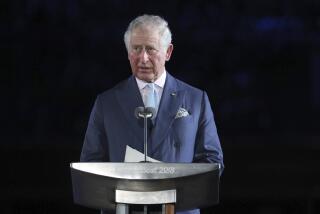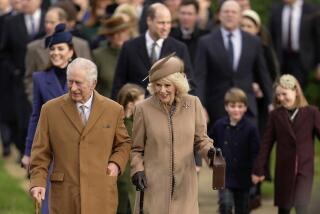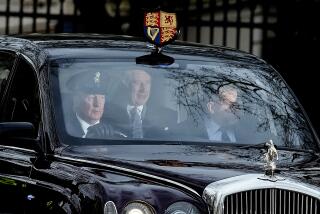Charles, Prince of Wails
- Share via
It is always good to see members of the British royal family reverting to what they do best: acting like over-pampered, underemployed, reactionary fuddy-duddies. Whatever you may have heard to the contrary -- about our attachment to the pomp and mystery of kingship, or our weakness for gilded carriages bearing fresh princesses to the altar -- we British are never happier with our royals than when they dispense with their daily pageantry just long enough to make thorough twits of themselves.
And Prince Charles, bless him, has just surpassed himself. As an English labor tribunal heard last week, he’s been having no end of trouble getting his head around the idea of a female black secretary making a request for career advancement. Elaine Day, who worked at Clarence House, his London residence, had the temerity to suggest she might qualify for training as a royal private secretary because she had a university degree. To which Charles spluttered back in a memo to her immediate superior: “What is wrong with people nowadays? Why do they all seem to think they are qualified to do things far beyond their technical capabilities?”
One might ask the same of the Prince of Wales, who, with his mediocre educational record and lifetime of waiting for Mother to vacate her job, isn’t exactly qualified for much himself. Clearly, this thought did not occur to him because his memo continued on a long rant against trends in modern education that, he said, had given people the delusion they could be pop stars, High Court judges, TV presenters or even heads of state “without ever putting in the necessary effort or having abilities.”
Or, as Algernon so memorably put it in Oscar Wilde’s “The Importance of Being Earnest”: “Really, if the lower orders don’t set us a good example, what on Earth is the use of them?”
Algernon, of course, sounded snobbish and dated when he made his stage debut in 1895. Prince Charles would have sounded snobbish and dated in 1795. But that, in the end, is his charm. Here is a man who has resisted the modern world with every ounce of his fiber since he was first old enough to upbraid his footman. Over the years, he has railed against the “deep aesthetic idleness” of modern architecture, advocated weird herbal cures, talked to the plants on his country estate and lobbied tirelessly for mutton to be restored to its rightful place on the British lunch menu.
Along the way, he somehow found himself married to the most glamorous celebrity the world has known since Grace Kelly and Marilyn Monroe, a part he flubbed completely. As Diana bounced from depression to the top of the world, overshadowing the entire House of Windsor as she went, he simply abandoned her and retreated to the horsy comforts of Camilla Parker Bowles. Strangely, in so doing, he may have pioneered a new path for the gloriously useless anachronism that is our royal family.
For more than a century, ever since Walter Bagehot rescued Queen Victoria from her widow’s grief with the notion she should reinvent herself as the lead character in a grand popular spectacle, the monarchy has been about entertainment much more than government. For Queen Elizabeth’s first 40 years, the show principally concerned Jubilees and Royal Weddings and happy middle-class family values in an aristocratic setting. When divorce and scandal put paid to that little fiction, it was replaced first by Diana’s celebrity hobnobbing and then, in the global hysteria surrounding her death, by an almost ghoulish fascination with tragedy and family dysfunction.
Now Charles seems to be suggesting old-fogeydom as the next wave. As a former advisor told the Observer newspaper last weekend: “He’s spent a decade trying all he can to be the nice, modern, thoughtful royal, and it’s got him nowhere. So, now he’s just said: ‘Sod it. I’ll be me. I’ll retreat into my peculiar constituency and the public can take me or leave me.’ ” It may not be much of a justification for a prince’s existence, but at the dawn of the 21st century it is perhaps the best anyone can offer.


